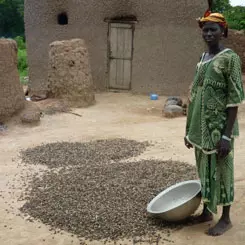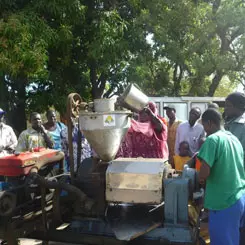
Environment and Biodiversity
Place
Senegal
Grant(s)
€ 80,000 to the Board of Administration at 2012/06/18
Project leader
GERES (Groupe Energies Renouvelables, Environnement et Solidarités)
Jatropha curcasis a shrub native to Brazil, called tabanani in Senegal. The seeds are pressed to extract an oil that is used in traditional medicine, to produce soap, for lighting, as fuel for diesel engines, etc. Because of its many uses, jatropha is not only an energy source but also a money crop for farmers.
The evaluation of the jatropha sector confirms its importance

In 2009, the Foundation initiated a program to support a bioenergy industry in Sokone, in southwestern Senegal. In May 2012, a Foundation team made a comprehensive review of the program and an assessment of the jatropha sector in Senegal, which confirmed its importance.
Among its many properties, jatropha needs very little water; it can grow on land exhausted by other crops (peanuts in particular), and thereby contribute to its remediation. It has a positive impact on reforestation. Studies demonstrate that jatropha helps fix the soil and improve the yield of other neighboring crops. One of the main challenges is to optimize the combination of food and bioenergy crops to enhance food security and create a new model of integrated local development, requiring limited initial investment.
About 35 biofuel projects have been launched in Senegal in the last 5 years. Three approaches coexist: the industrial approach (factory production of export biodiesel), the proximity approach (production and processing of jatropha in village facilities), and the mixed approach (local upgrading of bioenergies and volume reserved for export). A number of complementarities exist between the proximity approach, which includes the program backed by the Foundation in Sokone, and the mixed approach.
Coordinating the projects by creating a common benchmark and a "jatropha conference" in 2013

Strengthening coordination between the various experiments underway would help pool the resources, achieve economies of scale, and thereby enhance the economic, social and environmental spinoffs from jatropha cultivation. This is the approach suggested by GERES (Groupe Energies Renouvelables, Environnement et Solidarités) and backed by the Veolia Foundation.
Two guidelines have been set for this purpose: to participate in creating a benchmark (economic, methodological and regulatory) for the deployment of local jatropha industries in West Africa; organize a "jatropha conference" in 2013 gathering together the players involved, closely linked with GERES and its other partners. The Foundation's experience with local jatropha sectors is crucial for creating the benchmark and selecting the issues addressed at the conference.
Domain: Humanitary and Development
Country: Senegal
Endowment: 27/05/2008
Launch of a vegetable oil complex designed to produce biofuels in the region of Foundiougne.
Domain: Humanitary and et Development
Country: Senegal
Endowment: 26/01/2010
Testing the cultivation of jatropha to provide a permanent source of income to the farmers.

